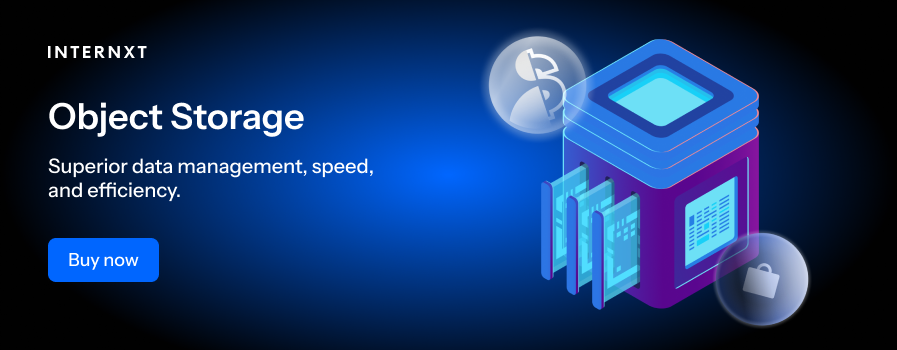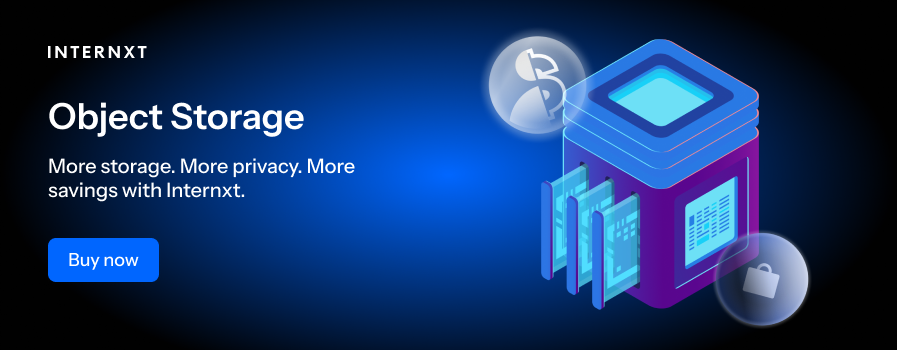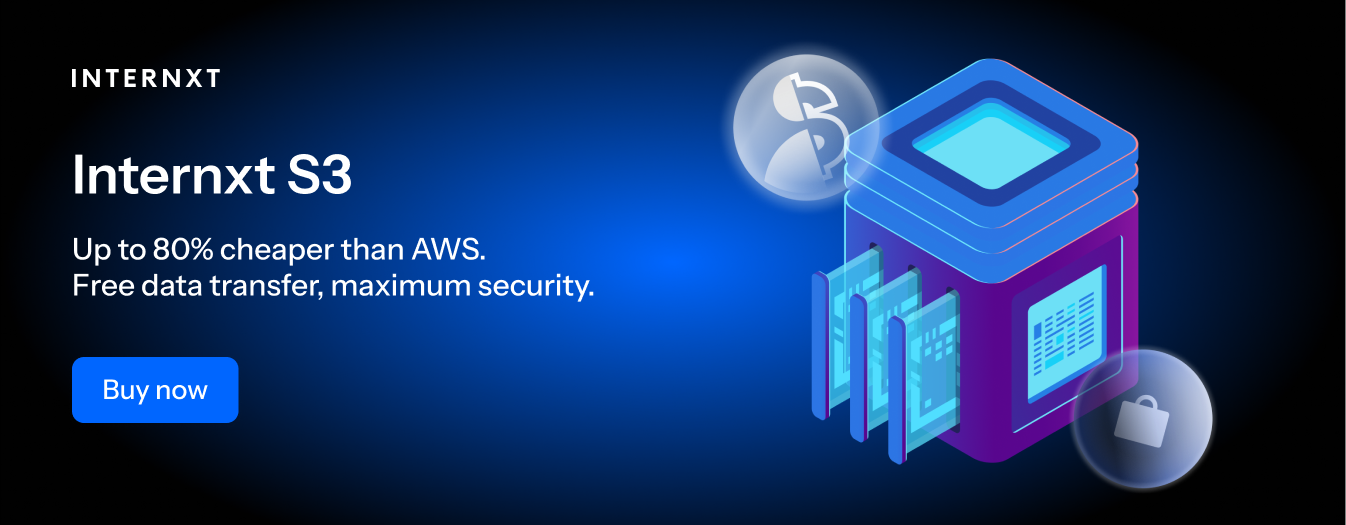Why GDPR Cloud Storage is Important for Businesses

Thanks to the rise of cloud storage, businesses now have a secure platform to store confidential files, client data, and customers' personal information. However, due to the sensitive data businesses store, the General Data Protection Regulation (GDPR) was formed on May 25, 2018.
The GDPR protects individuals' privacy and personal data in the EU. It aims to give people more control over their data, harmonize data protection laws across EU member states, and hold organizations accountable for data misuse or breaches.
The implementation of the GDPR has had a hugely positive impact on protecting our data online, and businesses must comply with these regulations or face fines that can cost them millions.
For this reason, GDPR cloud storage providers can help businesses comply with data protection laws, avoid fines, and build customer trust by guaranteeing your company takes customer privacy seriously.
In this guide, we will break down key parts of the GDPR and the specific sections GDPR cloud storage providers must meet.
We will also highlight what cloud storage options meet these requirements; whether it's Internxt Business or S3 storage plans, Internxt can offer your business the best storage platform to store and secure sensitive information.
Table of contents
- Data Processing Agreement (DPA)
- Data Protection Impact Assessment (DPIA)
- Data controller and data processor
- Right to Access, Rectify, and Erase Data
- Accountability and documentation
GDPR overview
The GDPR replaced the Data Protection Act, which was formed in 1998, and became the new standard for data protection in May 2018. The GDPR regulates personal data, meaning any information identifying an individual directly or indirectly must be protected.
Personal data covers:
- Basic identifiers: Name, address, email address, ID number.
- Online identifiers: IP address, cookies, device data.
- Special categories: Health data, biometric data, racial or ethnic origin, political opinions, religious beliefs, sexual orientation.
- Professional data: Employment details, education records.
Other compliance laws are restricted to certain regions, like the USA, the Medical industry, or other regions. The CCPA, for example, only applies to California residents. For more information about this, you can check out our GDPR vs CCPA blog article.
Who has to comply with the GDPR?
GDPR applies to all organizations that process personal data in the EU and those working outside the EU if they offer goods or services within this region.
GDPR cloud storage providers must be aware of EU compliance laws, such as the seven principles for processing personal data, which are:
- Lawfulness, fairness, and transparency: Data must be processed legally, fairly, and transparently.
- Purpose limitation: Data should only be collected for specific, explicit, and legitimate purposes.
- Data minimization: Only the data necessary for the purpose should be collected and processed.
- Accuracy: Data must be accurate and kept up to date.
- Storage limitation: Data should not be kept longer than necessary and only for its intended purpose.
- Integrity and confidentiality: Data must be processed securely to protect against unauthorized access, loss, or damage.
- Accountability: Organizations must take responsibility for compliance and demonstrate adherence to these principles.

Another important aspect of the GDPR that companies must consider is implementing technical measures within the product and organization that meet what’s known as the CIA triad, which refers to:
- Confidentiality: Only authorized individuals can access data to prevent leaks or breaches.
- Integrity: Guarantees that data is accurate, complete, and protected from being altered by an outside party or corrupted.
- Availability: Meaning anybody can access data at any time (by authorized users) when needed to avoid downtime that may occur due to technical issues or cyberattacks.
When complying with the GDPR European companies must continuously work to meet these regulations, such as Data Protection Impact Assessments (DPIAs), updating privacy policies, and regularly reviewing data processing activities.
Failure to comply with the GDPR can result in fines of up to €50 million, or 4% of the company's annual global turnover, whichever is greater.
In 2019, for example, Google was fined €50 million by the French National Commission on Informatics for lack of transparency, inadequate information, and valid consent regarding the personalization of ads.
Fines like this demonstrate the need to switch to companies like Internxt, an open-source and GDPR cloud storage provider with full transparency over how it protects sensitive information.
As of January 2025, the EU parliament voted for the DORA regulation to come into effect. DORA is another compliance body aimed at helping financial industries with their security, so it is important to be aware of this if you work in the EU finance industry.
Requirements that GDPR cloud storage needs to meet
When considering your cloud storage plans for your business, it's important to note that GDPR has specific requirements that apply to cloud storage. Depending on the size and budget of your team, you can seek advice from legal professionals who specialize in data protection laws.

Below are the general requirements that GDPR cloud storage services must meet.
Data Processing Agreement (DPA)
A Data Processing Agreement, or DPA, is a legally binding contract between the business collecting data and the cloud provider handling the data.
The contract ensures that both parties have clarity regarding their responsibilities and obligations related to how data is processed.
Data Protection Impact Assessment (DPIA)
A DPIA helps organizations assess, identify, and mitigate the risks of processing personal data. This is required when processing personal data that may result in high risks to an individual's rights and freedoms, such as processing sensitive data on a large scale or profiling or tracking a person's activity.
Key steps of the DPIA involve
- Outline the nature, scope, context, and purposes of data processing.
- Evaluate whether the processing is necessary for the intended purpose or if less intrusive options could be used.
- Identify potential privacy and security risks to data subjects, such as unauthorized access or data breaches.
- Propose measures to reduce or eliminate identified risks, such as data encryption.
- If the DPIA indicates high risks that cannot be mitigated, the business must consult the Data Protection Officer (DPO) or the relevant data protection authority.
A DPIA is a crucial aspect of GDPR cloud storage platforms. It helps businesses identify privacy risks early, ensuring compliance with GDPR while minimizing the risk of data breaches, fines and reputational damage.

Data controller and data processor
A data controller determines the means of processing personal data, and the data processor processes personal data on behalf of the data controller.
In the case of cloud storage, the data processor is the cloud service provider, and the organization using the cloud storage is the data controller. Both the data processor and provider must have a data processing agreement that clearly outlines their responsibilities for data processing when working within GDPR guidelines.
Right to Access, Rectify, and Erase Data
The right to access, rectify, and erase data is also part of a GDPR compliance checklist that cloud storage providers must support businesses in fulfilling GDPR related to an individual’s right to:
- Access data so businesses can retrieve and provide individuals with a copy of their personal data upon request, which should be presented in a structured, commonly used, and machine-readable format.
- Correction: Whenever an individual requests their personal data to be updated or corrected, the provider has to provide the mechanisms to modify or update the data accurately and efficiently.
- Deletion: Cloud providers need to ensure they can meet “right to be forgotten” requirements, where they have to fulfill a request to delete an individual’s personal data from its primary systems and backups.
These measures ensure companies and businesses maintain GDPR compliance and build customer trust with effective, safe, and secure data handling.
Accountability and documentation
Accountability and documentation are essential for GDPR compliance and a business's auditing process.
Documentation refers to maintaining detailed records of data processing activities outlining how personal data is collected, stored, used, and secured and should be tracked and documented effectively.

Businesses should also monitor data access, changes, or other activities through audit logging and reporting for audit reports and investigations.
How Internxt can help your business with GDPR compliance
Internxt is based in Valencia, Spain, a GDPR-regulated country, so it meets the requirements as a GDPR cloud storage provider.
Internxt is also SOC 2, HIPAA, and ISO 27001 compliant, offering the best security standards for all needs, whether it's personal or business storage you need, Internxt meets the highest standards to protect data.
All of our European data centers are compliant with multiple geographical compliance laws, which you can find out more about on our website.
With the following features, you can see how Internxt is the best cloud storage for business to store and collaborate with teams while guaranteeing the privacy and security of data stored with Internxt Drive for business or Internxt S3-compatible object storage.
Encryption
Internxt uses the industry standard AES-256 end-to-end encryption for its business and S3 storage plans that encrypts files directly on your device, guaranteeing that all data is protected from hackers or other cyberattacks to reduce the risk of data breaches significantly.
On top of that, Internxt will be one of the first GDPR cloud storage providers in Europe that uses post-quantum encryption, so your business data will be protected from the future threats of quantum computing threats, which could potentially break current encryption protocols.
For further privacy, Internxt is a zero-knowledge provider. Unlike Google Drive, OneDrive, or other companies, Internxt does not hold encryption keys to your data, so unlike these companies, Internxt can never access or view your files. You control your data, and Internxt provides the platform to secure it.
Session management and monitoring
To ensure accountability and documentation, Internxt business plans allow the account manager to add members to departments to ensure only the necessary employees access data that they are authorized to view.
Internxt business cloud storage includes advanced session management tools that let the account owner access real-time login notifications and detailed remote session monitoring to view the client, OS, IP, location, and last active time.
This feature helps businesses document account activity to meet compliance regulations and security audits and ensure the necessary access controls are implemented, monitored, and controlled.
Data backup and redundancy
To adhere to GDPR laws regarding data recovery and redundancy, you can backup your files with Internxt on Windows, Mac, or Linux so data is always accessible in case of accidental deletion, corruption, or other external factors.
For further protection, multiple copies of your files are encrypted, split, and distributed across multiple data centers, meaning that if anything happens to one data center, such as fires or other natural disasters, your files will be backed up and safe in a separate center, and can still be accessed.
How to get started with Internxt GDPR cloud storage
Internxt offers two storage options for cloud storage, both of which are GDPR-compliant, secure, and private. Internxt business plans can help your company and team collaborate, share, and store files without worrying about data breaches or fines.

Internxt S3 lets your company meet your data lake needs by offering an object storage solution that allows for vast amounts of storage that are instantly accessible without any data transfer fees.
Internxt Business Plans pricing
Internxt offers two business plans, Standard and Pro, which are charged annually per user.
- €79.99
- 1TB storage/user
- Create and manage users & teams
- Starts at 3 users and up to 10
- Two-factor authentication (2FA)
- Manage account billing & payments
- Premium customer support
Internxt S3 pricing
Internxt’s S3 object storage is charged using a pay-as-you-go model, so your business can scale storage based on its needs. Internxt S3 is up to 80% cheaper than AWS, Azure, and Google Cloud as there are no no hidden or additional data transfer charges.
Get started with Internxt Object Storage for just €7/TB/month to get the best GDPR cloud storage for enterprises needing to store vast amounts of data.
Thanks to the GDPR, cloud storage, and businesses can save millions when working together. With Internxt as your business partner, we guarantee that your files will have the most advanced security and tools so you can have peace of mind that your business and team are working in an environment that values and protects user data.

